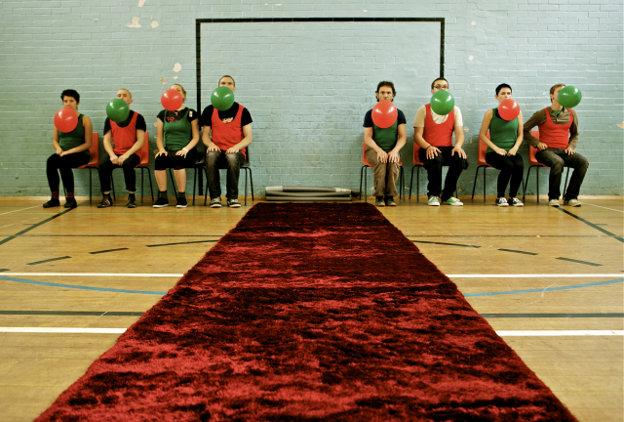The Belarus Free Theatre are outspoken critics of the Belarus regime – a company who have themselves faced political repression and who have first-hand experience of arrests, protests and refuge. Minsk 2011: a Reply to Kathy Acker is a theatrical telling of Minsk and its many scars, with a particular focus on freedom of expression and sexuality as contrasted against the pioneering work of Katy Acker in 70s New York. ‘Welcome to Minsk,’ they say in their own language. ‘The sexiest city in the world!’
The opening scene speaks volumes. One performer takes out the national flag and is carried away by officials, another performer takes out a pride flag and is carried away by officials, another performer simply claps his hands and is carried away by officials. Finally, a performer stands and does nothing; the officials gather round him intimidating him, and then carry him away. Balancing these choreographed examples of the reality of life under the regime with facts – such as that it is illegal to gather in groups of more than three – we begin to grasp the state of this city.
A performer lists his scars and how he received them, mirroring the structure of the show, as Minsk’s scars are opened up to us. One scar torn wide open is the city’s political involvement with the sex industry. A haunting scene is bluntly portrayed as an officer assesses an erotic dance routine to pass it as erotic rather than pornographic. The women in this scene are vulnerable and obviously dependant on the validation from this official to survive.
The show builds to a climax as the company sing old traditional folk songs whilst covering a naked woman in black paint. She is like a child who is being poisoned by the city, by its rules, by its sex, and is thrown out as a monster, bewildered and flippantly bearing a whip. This almost ritual representation of the impact of the city on its people has high emotional effect.
The nine performers end the show by talking honestly about their own relationship to the city. This moment is calm and conversational; they laugh or cry amongst themselves. It becomes overwhelming that these people are dedicated to a city that is so abusive towards them.


